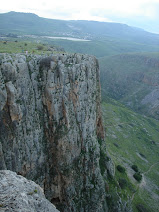A friend of mine works in an intercity, interracial church. Her church has an old and fairly common history. It was a large city church that peaked membership before the demographics of the neighborhood changed. Now in a neighborhood too often characterized by crime and violence, they are trying to understand their place in the world. They have several ministries under the roof of the church to try to cover expenses, and they are consciously working on issues relevant to the surrounding community.
One night, my friend contacted Cindy and me, rather upset, because her church was considering a difficult vote. It seems one of the large, predominantly white, churches in town wanted to start an African-American mission in her area. This large church was extending an "offer" to my friend's struggling church. The big church would "allow" the struggling church to donate their facilities to the large, white church since they were "clearly dying." There would be no money for the current membership to begin a new church. There was no provision or severance for current staff. They would simply be out of work.
My friend's church was trying desperately to provide an important voice for racial integration in the area. Still, that is hard work, and I think many in the church were tired. Whether or not to accept this "offer" was a matter of some inner struggle for the church as well. Quoting my friend, "There are some people in our church who think we need to do this because it will mean the building is refurbished and continues in the Southern Baptist tradition. But, most people in our church DO NOT believe that we are done here with our mission of reaching out into our inner-city neighborhood. There are 16 African-American churches in our neighborhood in a 1 mile radius and we believe one of the reasons we are here is to provide racial reconciliation and hope to beautiful people who God loves but the world does not. "
The motion was before the church, and the vote was to be taken the next Sunday. My friend was running out of time and options and didn't know what to do.
From the title of this article, you might imagine it is going to be a story about my friend. Actually, it is a story about me. You see, I was deeply troubled by this situation. I felt that this was bullying—plain and simple. I listened to the situation, and I tried to imagine what I might do from hundreds of miles away. Then, it came to me. This might be a story the local news might be interested in. So, I sent an email to the editors of their local paper, and I suggested that if they got involved, they could prevent a great wrong from taking place.
A few days later my friend called to tell me that the religious editor from the local paper had called her church and had called the large, white church. Once the questions were asked, it turns out that this was not a move by the big church, but by an over-zealous pastor who was trying to find facilities for his church's new African-American mission. After all the attention they started getting, he called to tell the little church that there was no offer, and they should take the claims of an offer off the church website (the same offer he had three days before called "correct").
Thankfully, this story has a happy ending. The little church is still working hard. The big church is still looking for facilities for their mission.
This story has stuck with me though. It hasn't stuck with me in the "Oh, look how great and smart I am" way. It has stuck with me in a much more haunting way. I keep asking myself, "What happens if I don't send that email?" I am just one person out of the thousands affected by this decision. I was the only one who thought to involve the press. What happens if I don't? What happens a few days later when the church votes?
Hurrah for me. For once in my life, in one shining moment, I was smart and sensitive and courageous enough to do what God was asking. But, if I am honest, when I think about this story, I don't think about it that way. I keep thinking about the myriad other times when I am too selfish, too cowardly, or too deaf to hear what God calls me to do? If I don't send that email, the world unfolds differently . . . and not in a better way. How many ways have I affected the world in a negative way by my inaction in the little things? Sending an email seems like such a small thing, and it had far-reaching consequences. I have found myself paying more attention to the little—seemingly insignificant— things I am doing every day. Maybe, this one moment of success that affected so many people can remind me to be more faithful in those little things.



